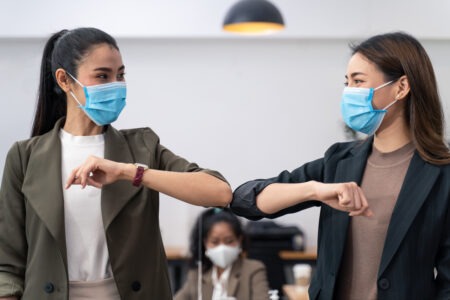Resocialization… that’s a new word we’re hearing more and more these days – and something none of us thought too much about before the Covid-19 pandemic.
You’ve probably heard of the term ‘socialization,’ maybe in reference to school-age children learning how to play with others outside of their home, or even household pets that are aggressive towards new people. Socialization is a journey of learning the values and norms of a group, organization, community, or society as a whole. Resocialization occurs when a massive change, like a global pandemic, forces you to establish new values and norms about socializing that are different from what you are already accustomed to. We adjusted these norms during periods of shutdown, and now we are re-adjusting those norms again as we find ways to come together safely.
Resocialization is more difficult for people than initial socialization because it adds an uncontrollable stress factor to life and can seep into other areas like personal relationships. When re-acclimating to socializing in your community and work environment, you will likely experience a wide range of emotions. This is normal and it is important to stay in touch with your emotional and physical reactions during stressful times, addressing those stressors and your reactions in a healthy way. It’s also important to support your family members, neighbors, and coworkers as they experience these challenges and emotions too.
Many of us have been working remotely since the first quarter of 2020, and returning to the office environment – and other everyday social activities – will require some readjusting. You may be reintroducing a commute to your routine or readapting to a less flexible schedule as you transition away from working from home. You may have anxiety when attending social gatherings, or getting on a plane. But the good news is that there are strategies we can use to help ourselves and each other as we readjust to another “new normal”.
To be most successful, you need to prepare for, recognize, address, and adapt to changes in the workplace and in every-day social interactions. Make plans, ask questions, and make sure you feel prepared for social situations you will be engaging with. The more prepared you are, the less anticipatory stress you will feel. Also be clear about setting expectations before everyone is together. It’s far easier if everyone knows how many people can be in the conference room, and if masks are required, before everyone is gathering for an in-person meeting.
When you’re adapting to change, it’s also important to be aware of how you’re feeling. Everyone is at a different comfort level with resocialization, and that’s ok. A useful phrase to keep in mind is to “meet yourself where you are.” This means acknowledging how you feel about something, recognizing how it may affect you, and taking the necessary steps to get to where you need to be. It also entails recognizing and accepting others who aren’t in the same place as you, mentally or emotionally. With the right support, resocialization can be a positive opportunity to get to know ourselves and each other better, and for personal growth.
By Carolyn Callery and Carla Torgerson at TorranceLearning
For more, check out the Eleventure course from TorranceLearning, “Resocializing after Covid-19.”
 Carolyn Callery is a Learning Experience Designer at TorranceLearning. Her customer service experience and education in the social work field provides her with a skillset to meet the client “where they are” and work to provide excellent customer interactions and results. She loves to get people excited about learning.
Carolyn Callery is a Learning Experience Designer at TorranceLearning. Her customer service experience and education in the social work field provides her with a skillset to meet the client “where they are” and work to provide excellent customer interactions and results. She loves to get people excited about learning.
 Carla Torgerson is the Head of Learning Experience Strategy at TorranceLearning. She dives deep into complex client projects, helping to deliver performance solutions that both consider the learner’s needs and meet business objectives. Carla and the team at TorranceLearning help a variety of organizations connect learning strategy to design, development, data, and ultimately performance. In addition to strategic consulting and design, Carla is the product manager for TorranceLearning’s Eleventure® course series and the ID Ways of Working (WoW!) professional development community.
Carla Torgerson is the Head of Learning Experience Strategy at TorranceLearning. She dives deep into complex client projects, helping to deliver performance solutions that both consider the learner’s needs and meet business objectives. Carla and the team at TorranceLearning help a variety of organizations connect learning strategy to design, development, data, and ultimately performance. In addition to strategic consulting and design, Carla is the product manager for TorranceLearning’s Eleventure® course series and the ID Ways of Working (WoW!) professional development community.




